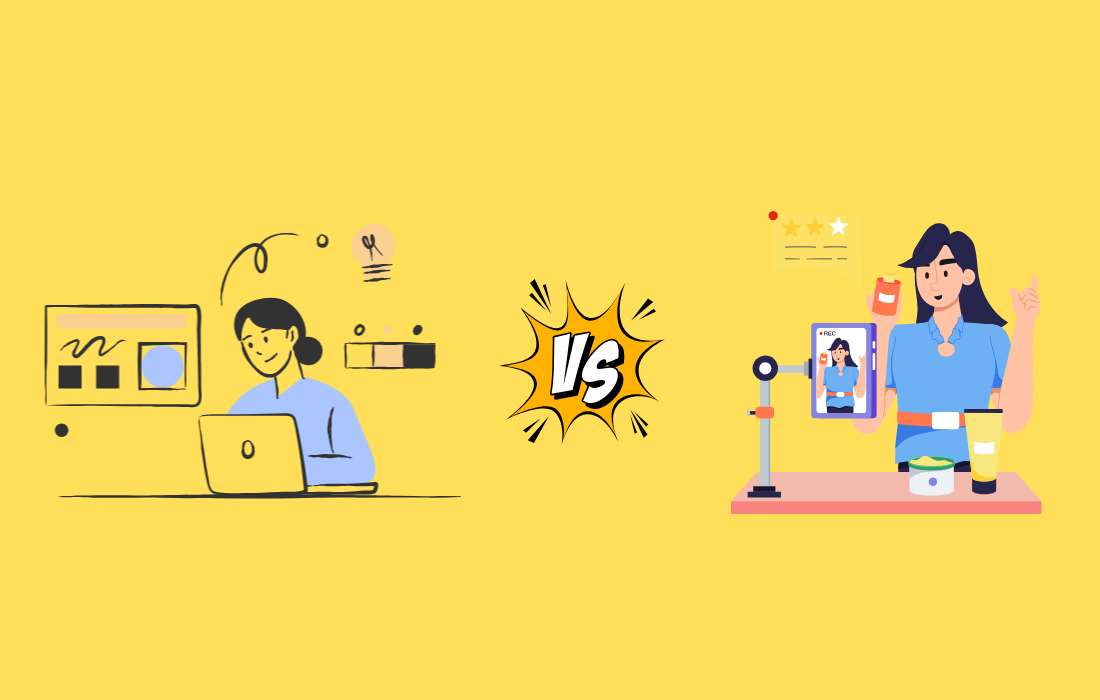In today’s social media driven world, it has almost become a fad to throw terms like ‘content creators’ and ‘influencers.’ These two popular terms have become almost synonymous with social media marketing and also digital marketing. But there is one interesting thing that we feel that everyone should know, especially those who want to keep updating their knowledge about social media and digital marketing.
Content creators and influencers are not the same thing. They are completely two different professional roles. Surprised! I think most people will be surprised, especially considering that today almost everyone uses these two terms interchangeably.
But how are they different from each other?
They are different because both require different skill sets and are propelled by different motivations and strategies.
You’ll get more clarity about these aspects in this comprehensive blog post.
Who are content creators and what they do?
The answer to this question lies in the name of the profession itself. Simply put, content creators create content and hence the name. They create blog posts, videos, photos, infographics, newsletter content and many other forms of sharable and digital content.
This content is shared across several popular social media and online platforms, like Instagram, Facebook, Twitter, YouTube or on the official website.
Creating content is just one part of being a content creator. The more critical and important part is to create highly engaging content, the one that is highly informative yet entertaining and ultimately resonates with the target audience.
It is equally worth knowing that content creator is a broad and blanket term that is used for diverse professions. This includes content writers, video content creator, graphic designers, copy writer, SEO content specialist and podcast producers.
Lastly and notably, content creators are not at all concerned about personal branding or increasing their followers on the social media.
Who are influencers?
Influencers are popular personalities. To put it more precisely, they are social media celebrities and hence sometimes they are also referred to as social media influencers. They basically leverage substantially large and mass followings on social media platforms for promoting brands and lifestyle choices.
Unlike content creators, Influencers focus on personal branding and also promoting third party brands in the exchange of money or commercial benefits.
How to recognize if someone is an influencer?
If you bump into someone on Twitter or Instagram with thousands of followers boasting a health or fashion product with or without sponsored tag, they are probably influencers.
Overlapping Roles
One of the interesting things when we compare influencers and content creators is that their lines can get blurred and the roles can get bit reversed. And this is exactly where the confusion starts. To put it more bluntly, influencers can sometimes create content and content creators can try to influence their audience.
While the lines certainly get blurred, where they differ is the motivation and intention.
Influencers try hard to convince their followers, either to buy a specific product or service or create an awareness about it. The overwhelming urge to influence influencers is one of the unmistakable and undeniable traits of the influencers.
While content creators may also try to influence, their overriding goal is not to convince the end users to buy a product or service. They largely focus on engagement, trying to build an emotional chord with end users in order to create a positive awareness about the product or service.
How Content creators and influencers deal with brands?
Influencers and content creators also differ in how they deal and work with brands.
Let us first talk about content creators.
When it comes to content creators, they can work with brands at two levels.
- Freelance content creators.
- In-house content creators.
Freelance content creators work independently with several brands through commercial contracts, using their different skill sets to create and generate highly engaging content. Content writing, video editing, graphic designing are some of the popular skill sets that content creators offer to brands.
In-house content creators, on other hand, work as full-time employees. They can work as full-time employees of digital marketing agencies or B2B or B2C companies, where they can offer their expertise skill sets depending on the nature of their work.
When it comes to influencers, they usually work as freelancers or lend their service through sole proprietorship. Similar to freelance content creators, they also tie-up with several brands through commercial contracts (also known as influencer contracts).
Separately, they can also collaborate with influencer marketing agencies on commission basis.
Their remuneration and commission is based on their number of followers and the level of engagement that they can garner for the brands.
Who are independent content creators?
Independent content creators can be a major source of confusion, with many again confusing them with influencers. Many may also confuse them with freelance content creators. But they are neither influencers nor content creators.
Independent content creators are individuals who produce original content in various formats (videos, reels, & blogs), primarily driven by personal passion and creativity. Their main goal is to demonstrate their unique skill sets and craft to a certain target audience, while focusing on monetization through avenues like ad revenue, subscription or affiliate marketing.
A cooking enthusiast sharing her latest recipes on her YouTube channel is a good example of independent content creator.
A passionate traveller sharing his traveling experience on his blog is also a good example of independent content creator.
Key Differences Between Influencers and content creators
| Aspects | Influencers | Content creators |
|---|---|---|
| Main goal. | Building relationship & influencing target audience. | Creating high quality content. |
| Monetization. | Sponsored posts & Brand endorsement. | Ad revenue & subscription. |
| Focus. | Creating brand awareness & personal branding. | Content expertise, storytelling, sharing their passion & skills. |
| Engagement. | Highly interactive with followers. | Content driven engagement. |

